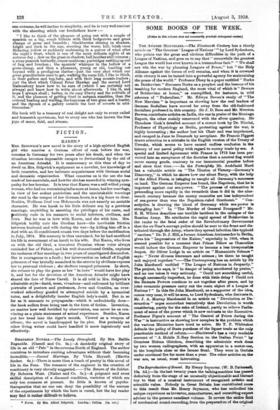FICTION.
KAREN. *
MRS. SIDGWIOIC'S new novel is the story of a high-spirited English girl who marries a German officer of rank before the war, remains in Germany for two years after his death, and when the situation becomes impossible escapes to Switzerland by the aid of an American Attaché. It is unnecessary at this time of day to dwell on Mrs. Sidgwick's equipment as a novelist, her knowledge of both countries, and her intimate acquaintance with German social and domeistic organization What concerns us is the use she has made of her materials, and how far she has suceeded in winning sym- pathy for her heroine. It is true that Karen was a self-willed young woman, who had no restraining influences at home, but her marriage, in view of her ardent patriotism and the unmistakable warnings she read in the temper of her German hosts, is a big fence to clear. Besides, Wolfram Graf von Hohenroda was not exactly an amiable character. He was harsh to his little delicate son by a previous marriage, unyielding in asserting the privileges of his caste, and positively rude in his manners to social inferiors, civilians, and Jews. But he was in love with Karen, and she with him. Mrs. Sidgwick boldly cuts the Gordian knot—the inevitable friction between husband and wife during the war—by killing him off in a duel with an ill-conditioned cousin two days before the mobilization in July, 1914. His memory is thus unstained, for he had sacrificed his life in resentment of an insult to his wife. But Karen, who lives on with the old Graf, a truculent Prussian whose voice always reminded her of Fafner, and his well-domesticated Gritfut, expiates the rashness of her marriage in two years of unmitigated discomfort. She is courageous to a fault ; her intervention on behalf of English prisoners of war brutally assaulted in the streets by civilians exposes her to personal violence ; she shelters escaped prisoners. In short, she refuses to play the game as her " " would have her play it, and but for the devotion of the American Attaché might have shared the fate of Nurse Cavell. It is all told in Mrs. Sidgwick'a admirable style—lucid, terse, vivacious—and enlivened by brilliant portraits of pastors and professors, Jews and Gentiles, an over- worked schoolboy goaded to attempted suicide by a tyrannical tutor, and a delightfully insular English lady's-maid. But in so far as it amounts to propaganda—which it undoubtedly does— the book suffers from being cast in the form of fiction. Invention, no matter how well fortified by observation, can never be as con- vincing as a plain statement of actual experience. Besides, Karen put her head into the tiger's mouth. Viewed as a weapon of offence, the novel is handicapped by its plot. But probably no other living writer could have handled it more ingeniously and effectively.


























 Previous page
Previous page